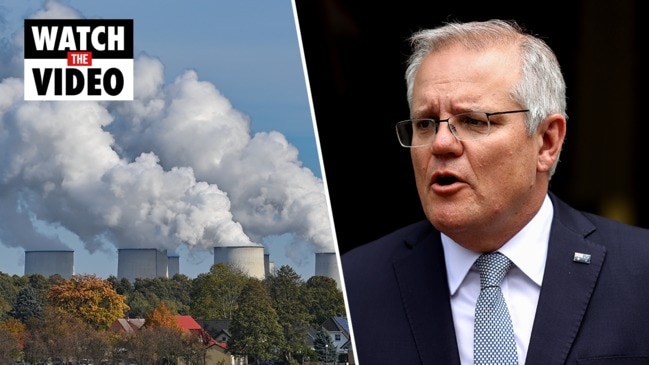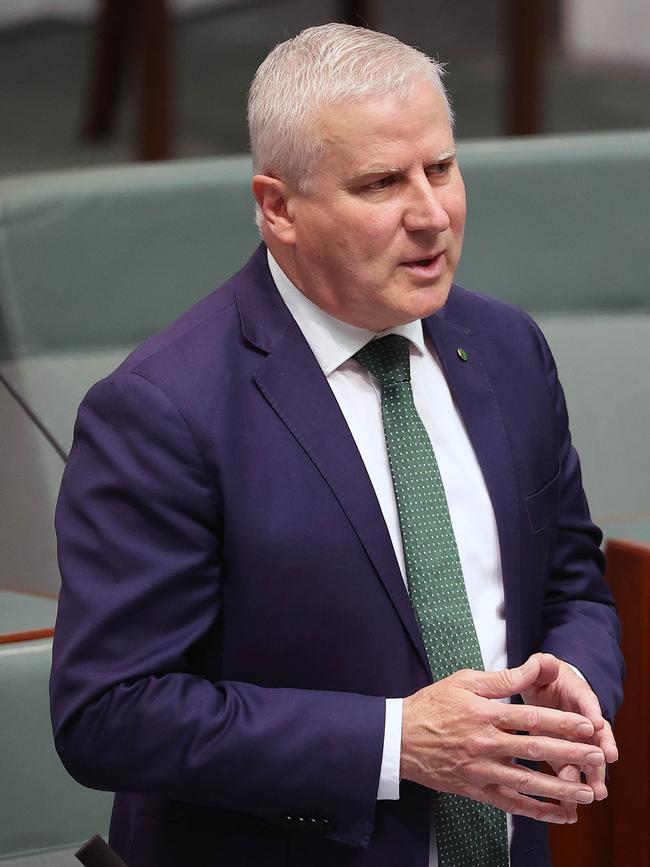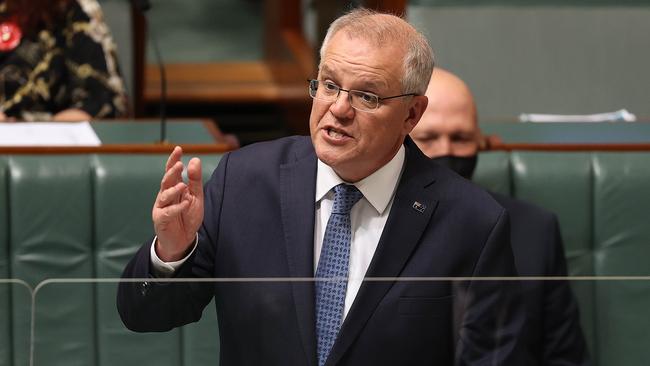Scott Morrison’s net zero deal may have collapsed without Barnaby Joyce’s leadership coup
If hindsight is 20-20, then here’s why Scott Morrison’s 2050 commitment might have collapsed without a Nationals leadership coup.

Opinion
Don't miss out on the headlines from Opinion. Followed categories will be added to My News.
There’s an alternate version of this month in Australian politics in which Scott Morrison might not have been able to land his 2050 net zero commitment without Barnaby Joyce.
That may sound strange, given the Deputy PM has struggled to convince anyone – let alone himself – that he is genuinely supportive of what is now government policy.
But imagine how this tortuous process could have unfolded had Joyce’s coup against Nationals leader Michael McCormack failed four months ago.
The challenge was orchestrated by Joyce and his allies on the basis that McCormack was not doing enough to stand up to the PM, particularly as Morrison inched towards locking in the net zero target vehemently opposed by a group of Queensland Nationals.
Joyce had long opposed such climate action, and after knocking off McCormack by one vote, the new leader declared the chance of his party deciding to “agree to net zero is zero”.
Had that one vote turned the other way, enabling McCormack to cling on, Joyce would surely have used the instability within the Nationals over the 2050 target Morrison wanted them to accept before the Glasgow summit to launch another attack on McCormack’s leadership.
In this scenario, a successful Joyce challenge would have forced Morrison to make an impossible choice: split the Coalition and plough ahead with net zero anyway, or abandon the commitment and risk a Liberal uprising and global embarrassment.


At McCormack’s final press conference in June, he argued the best way for the Nationals leader to confront his Liberal counterpart was behind closed doors, and then publicly present a united front on the compromise they reached.
Ironically, that is exactly what Joyce has now been forced to do. A greater majority of his colleagues supported the 2050 target than voted for him to become their leader. Had he ignored their views, his own job could have been on the line, so Joyce had to co-ordinate the concerns of his party room and make demands of the PM on their behalf.
One sticking point was an extra cabinet spot for the Nationals. In another ironic twist, that meant Keith Pitt was restored to cabinet after Joyce sacked him in June. Had the coup failed, the Resources Minister – a vocal opponent of net zero – may well have been moved to quit cabinet in the face of Morrison’s 2050 push. Instead, he had the chance to argue against it for weeks, and his promotion means he now has to get on board too.
This version of hindsight is not meant to validate Joyce’s move to knock off McCormack. To Joyce’s enemies, his actions are not motivated by principle and policy, but by personality and power.
While McCormack may lack Joyce’s maverick charm, it is hard to imagine that he would not have fought just as hard – and probably even smarter – to protect regional communities in the transition to net zero.
The upshot of avoiding this alternate reality is that Morrison, with Joyce’s tepid backing, has landed a bipartisan consensus on net zero that will finally focus the nation’s emissions reduction effort.

The 2050 target has seemed like a fait accompli for so long – backed as it is by state governments, business groups, miners, farmers and more than 130 other countries – that it would be easy to overlook the significance of this decision for Australia.
For 15 years, Canberra’s climate wars have not only cost prime ministers and opposition leaders their jobs, but robbed the country of what it really needs to make the transition: certainty.
While the Coalition and Labor still disagree on which road to take to 2050, both parties are now driving to the same destination, giving investors confidence to come along for the ride.
Despite the protestations of his protégé Matt Canavan, Joyce seems to realise he cannot turn back. Barring a Trump-like movement in the Liberal Party, this status quo should stick.
Of course, this does not mean the political fight on climate is over. Instead, the rules of engagement are changing.
In a media blitz selling his announcement this week, Morrison barely mentioned the urgent environmental impetus to limit global warming. He framed 2050 as an economic challenge, and in doing so, posed the question he wants Australians to answer when they vote next year: who do they trust to protect their jobs and control the cost of living in the transition?
By sticking with Australia’s meagre 2030 target, even though official projections show it will be easily beaten, Morrison is also daring Anthony Albanese to drive down emissions faster in a way the PM warns would force the closure of industries and harm regional communities.
The Labor leader has so far seemed comfortable attacking Morrison’s plan to reach the 2050 commitment, seizing on its notable gaps and lack of modelling.
What comes next is the real test of Albanese’s mettle. Having shifted to a small-target strategy on so many core policy areas, is he willing to take Morrison’s bait and offer a more ambitious climate policy, knowing that will prompt a fierce Coalition scare campaign?
With both parties now targeting 2050, that is a debate worth having in the national interest.





